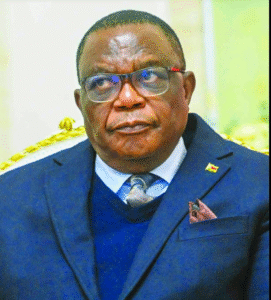ELECTION FRAUD AND OPPOSITION TARGETING EXPOSE ZIMBABWE’S DEMOCRACY CRISIS
In a troubling development for Zimbabwe’s democracy, the attempted disqualification of presidential hopeful Saviour Kasukuwere and the recent double candidate scandal linked to the Citizens Coalition for Change (CCC) have revealed deep flaws in the country’s electoral process. Both incidents, involving the Zimbabwe Electoral Commission (ZEC) and the ruling ZANU PF party, reflect a broader pattern of systemic manipulation, undermining the very foundation of fair political competition.
Saviour Kasukuwere, once a powerful ZANU PF member turned independent challenger, recently faced a calculated disqualification bid that has shaken public confidence in the credibility of the 2023 election process. His disqualification—based on minor technicalities—has widely been interpreted as a targeted move designed to remove a potentially threatening voice from the race. Many observers argue that it reflects a deliberate attempt to stifle any serious opposition and keep the political playing field tilted in favour of ZANU PF.
This move comes just after another scandal involving double candidates within the CCC, allegedly orchestrated by ZANU PF operatives with the apparent complicity—or negligence—of ZEC. The scandal saw duplicate candidates filed under the opposition’s banner, disrupting internal processes and confusing voters. Rather than safeguarding democratic principles, ZEC’s inaction and failure to address such glaring irregularities suggests either political bias or institutional incompetence—both of which threaten the integrity of Zimbabwe’s electoral system.
These events are not isolated blunders. Together, they paint a picture of a broader democratic decline, where opposition parties are systematically targeted, rules are selectively applied, and oversight bodies appear compromised. In such an environment, elections become less about reflecting the will of the people and more about preserving the power of the ruling elite.
At the core of any democracy lies the principle of equal opportunity for all political players. Citizens must be able to vote freely for candidates who represent a range of voices and visions. However, the disqualification of candidates like Kasukuwere and the manipulation of opposition nominations through state-supported interference violate these core values and damage the credibility of the electoral process.
The ruling party’s actions and ZEC’s failures are symptoms of a deeper issue: the erosion of institutional independence in Zimbabwe. Electoral integrity cannot survive in a climate where the body tasked with overseeing elections is seen as a political tool, and where the government systematically blocks fair competition.
These actions risk further isolating Zimbabwe on the international stage. As the country prepares for a crucial election, global actors must not remain silent. The African Union, SADC, and other international partners must pressure Zimbabwe’s leadership to commit to electoral transparency, impartiality, and reform. Independent observers must be allowed unfettered access to polling stations and voter registration data, and opposition parties must be protected from arbitrary exclusion or sabotage.
The road forward requires urgent reform. Zimbabwe needs a genuinely independent electoral commission—one with the resources and autonomy to enforce laws fairly and resist political interference. Legislation must be tightened to prevent abuses, while civic education and judicial safeguards are strengthened to ensure voters and candidates alike can participate freely and confidently.
Ultimately, it is the Zimbabwean people who must reclaim their democracy. The recent targeting of Kasukuwere and the chaos around CCC nominations are reminders of what is at stake. Without a serious course correction, the country risks sliding further into authoritarianism, where elections are merely theatre and political power remains unaccountable.
But there is still hope. If citizens, civil society, and international allies unite to demand free, fair, and transparent elections—if they demand better from ZEC and hold ZANU PF to account—then the vision of a democratic Zimbabwe can still be realised.
The time for action is now. Zimbabwe’s future depends on it.



